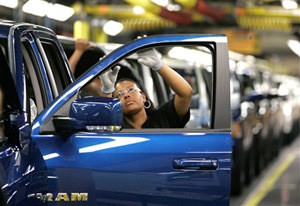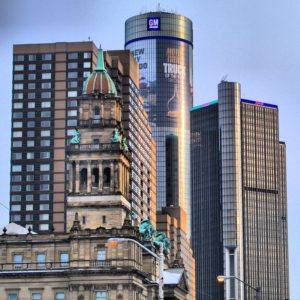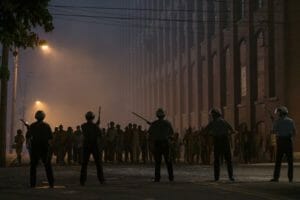Steering Clear of Disaster in Detroit
If jobs weren’t disappearing and a depression threatening, it would be easy and satisfying to send the American auto industry into bankruptcy or liquidation. But this isn’t the time to make Chrysler, General Motors and Ford pay for their years of failure and shortsightedness.
If jobs weren’t disappearing and a depression threatening, it would be easy and satisfying to send the American auto industry into bankruptcy or liquidation.
But this isn’t the time to make Chrysler, General Motors and Ford pay for their years of failure and short sightedness. President-elect Barack Obama and Congress must prevent a repeat of the Great Depression and put people back to work. A lot of people were impelled to vote for Obama because they feared hard times. Now he is assuming office with a nation expecting him to make things better.
It is hard to say anything favorable about the automakers after watching their CEOs travel to Washington via private jet and testify before Senate and House committees. They were unrepentant for building all those gas-guzzlers and for kissing off demands that they build energy-efficient vehicles.
Their sense of entitlement was the result of years of the auto companies being babied in Washington.
Their main man was Democrat John Dingell of Michigan, chairman of the powerful House Energy and Commerce Committee, which has jurisdiction over issues ranging from climate change to health care to telecommunications. He was supported by Democrats and Republicans and by the United Auto Workers Union, long a mainstay of the Democratic Party.
One of the most damaging acts of Dingell and his allies was to greatly ease the fuel economy standards for sports utility vehicles. They did this by classifying them as light trucks, which are permitted to be less fuel efficient than cars. They justified their action because the automakers put the big SUVs on light-truck chassis. Lower fuel efficiency standards made it easier and cheaper to make and sell the monsters.
Dingell was revered and feared by the Washington establishment until Rep. Henry Waxman of California unseated him as committee chairman this week. Waxman has strongly advocated stricter fuel efficiency standards and legislation curbing greenhouse gas emissions.
His views on those issues will be important as lawmakers discuss an auto rescue package, which was turned down despite the pleas of the Big Three CEOs. Both Senate Majority Leader Harry Reid of Nevada and House Speaker Nancy Pelosi of San Francisco told the executives to return next month with more details on just how a bailout could save their companies and help the country.
By then Obama hopefully will be more specific about what he wants to do with the auto industry. On TV’s “60 Minutes” recently, he said: “For the auto industry to completely collapse would be a disaster in this kind of environment, not just for individual families, but the repercussions across the economy would be dire. So it’s my belief that we need to provide assistance to the auto industry. But I think that it can’t be a blank check. … So my hope is that … we are creating a bridge loan to somewhere as opposed to a bridge loan to nowhere.”
Of all the arguments for rescuing the industry, saving the failing economy is the strongest. The Center For Automotive Research, which is affiliated with the auto and oil industries, estimated that almost 3 million jobs would be lost in the first year if the three companies could not quickly reorganize under bankruptcy laws. Other estimates are slightly lower, but they also forecast huge job losses.
Obama owes an auto industry rescue to those who voted for him, as well to as to the rest of the country. Before the September economic collapse, Obama’s election was far from certain. Home foreclosures, the freezing of credit, the stock market drop and rising unemployment pushed the doubters to his side.
In the beginning of the Obama campaign, hope was a word so vague it was easily derided. But as the nation began to panic, it meant something when he said it, something as specific as a job or a home.
Hope was what Franklin D. Roosevelt offered during the Great Depression. We didn’t get full employment until the buildup for World War II. But Roosevelt saved millions of people from foreclosure and put millions to work before the war on public works projects, which also created jobs throughout the supply chain in industries making things like steel, building materials and electrical goods.
Hoover Dam and the Grand Coulee Dam were highly visible symbols of FDR’s national recovery, as were schools, campgrounds, libraries, hospitals and stadiums all through the country. They inspired a dispirited nation.
Obama should launch such a public-works jobs program—not make-work assignments, but projects to create infrastructure that will last for many generations, just like those from FDR’s days.
Letting the auto industry collapse or slide into bankruptcy would wreck the national recovery effort. It would put men and women out of work in the car factories, small metalworking plants, auto dealerships, plastics companies, tire makers and many other enterprises all over the country. They would join the 10 million-plus Americans already unemployed. It would be a devastating blow to the country—and to the Obama administration.
Your support matters…Independent journalism is under threat and overshadowed by heavily funded mainstream media.
You can help level the playing field. Become a member.
Your tax-deductible contribution keeps us digging beneath the headlines to give you thought-provoking, investigative reporting and analysis that unearths what's really happening- without compromise.
Give today to support our courageous, independent journalists.





You need to be a supporter to comment.
There are currently no responses to this article.
Be the first to respond.